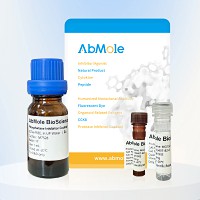All AbMole products are for research use only, cannot be used for human consumption.

Stromal cell-derived factor-1β (SDF-1β), also known as SCYB12, PBSF, and CXCL12, is an 8.3 kDa, heparin-bound member of the CXC(or α) chemokine family that signals via the CXCR4 receptor. SDF-1α and β are reported to be monomers at neutral pH and physiological ionic strength. At the cell surface, this may well facilitate the interaction of SDF-1 with its two receptors, CXCR4 and syndecan4. Heparan sulfate is known to protect SDF-1 from proteolysis, and CXCR4 exists as a dimer component. Among its many functions, CXCL12 is known to affect lymphogenesis, regulate neural progenitor cell patterns and cell numbers, and promote angiogenesis (12,13). It also enhances the survival of myeloid progenitor cells.
The biological activity determined by a chemotaxis bioassay using PHA and rHuIL-2 activated human peripheral blood T-lymphocytes is in a concentration range of 20.0-80.0 ng/ml.
Accession: P48061
Theoretical Molecular Weight: 8.5 kDa
Endotoxin < 1 EU/μg
Lyophilized from a 0.2 μm filtered solution in PBS, pH 7.4.
| Form | Lyophilized powder |
| Solubility (25°C) | Reconstitute the lyophilized powder in sterile distilled water or aqueous buffer containing 0.1 % BSA to a concentration of 0.1-1.0 mg/ml. |
| Storage | Stable for up to 6 months at ≤ -20°C. Upon reconstitution, the product should be stable for up to 1 week at 4°C or up to 3 months at -20°C. |
| Related Cytokines and Growth Factors Products |
|---|
| Recombinant Human GDF-15 Protein (HEK293 N-hFc)
Growth-differentiation factor 15 (GDF15), also known as MIC-1, is a secreted member of the transforming growth factor (TGF)-β superfamily. GDF-15 has a role in regulating inflammatory and apoptotic pathways in injured tissues and during disease processes. GDF-15 overexpression arising from an expanded erythroid compartment contributes to iron overload in thalassemia syndromes by inhibiting hepcidin expression. |
| Recombinant Human FGFR1 Protein (HEK293, C-His)
FGFR1, also known as CD331, is a full-length representative protein consists of an extracellular region, composed of three immunoglobulin-like domains, a single hydrophobic membrane-spanning segment and a cytoplasmic tyrosine kinase domain. |
| Recombinant Human FGFR2 Protein (HEK293, C-His)
FGFR2, also known as CD332, acts as cell-surface receptor for fibroblast growth factors and plays an essential role in the regulation of cell proliferation, differentiation, migration and apoptosis, and in the regulation of embryonic development. FGFR2 plays an essential role in the regulation of osteoblast differentiation, proliferation and apoptosis, and is required for normal skeleton development. It also promotes cell proliferation in keratinocytes and imature osteoblasts, but promotes apoptosis in differentiated osteoblasts. |
| Recombinant Mouse BMP-4 Protein (E. coli, C-His)
Bone Morphogenetic Protein-4 (BMP-4) is a critical signaling molecule required for the early differentiation of the embryo and establishing of a dorsal-ventral axis. BMP-4 is secreted from the dorsal portion of the notochord, and it acts in concert with sonic hedgehog to establish a dorsal-ventral axis for the differentiation of later structures. |
| Recombinant Human Coagulation Factor X (HEK293, C-Fc)
Coagulation factor X, belongs to the peptidase S1 family. Coagulation factor X is initially synthesized in the liver. Coagulation factor X is a vitamin K-dependent glycoprotein that converts prothrombin to thrombin in the presence of factor Va, calcium and phospholipid during blood clotting. |
All AbMole products are for research use only, cannot be used for human consumption or veterinary use. We do not provide products or services to individuals. Please comply with the intended use and do not use AbMole products for any other purpose.


Products are for research use only. Not for human use. We do not sell to patients.
© Copyright 2010-2024 AbMole BioScience. All Rights Reserved.
